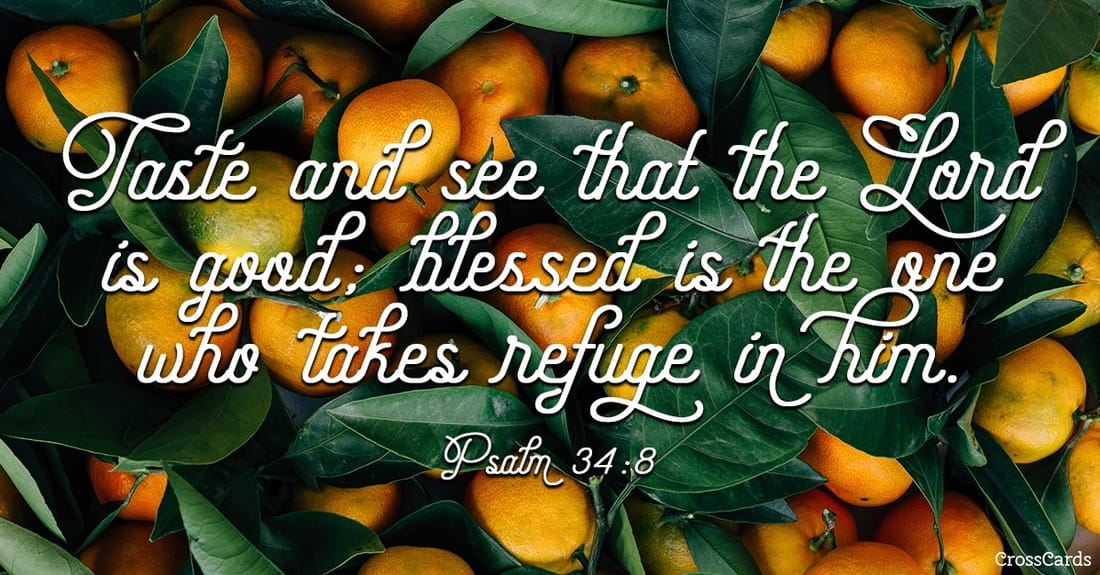“Oh, taste and see that the LORD is good! Blessed is the man who takes refuge in him! Psalm 34:8,
What does it mean to taste and see that the Lord is good? It seems a little odd to “taste” the Lord, doesn’t it? And if we’re a Christian, a man or woman of faith, don’t we already know the Lord is good? Maybe. Maybe not.
Psalm 34:8, where this portion of scripture is found, shares a story of murderous threats, insanity, and praise for God. Interesting mix, isn’t it? But perhaps this verse—not to mention our walk with Christ—has a deeper impact than what we see at surface level. Maybe we’re meant to go deeper.
What Is the Meaning of the Verse 'Taste and See that the Lord is Good'
Let’s investigate the meaning of the verse ‘Taste and See that the Lord is Good’ by starting with Psalms, specifically 34:8. “Oh, taste and see that the LORD is good! Blessed is the man who takes refuge in him! (PS 34:8 ESV)
Consider the first part of this verse a warm hand extended in love—an invitation to draw close to God, to experience His love and the goodness surrounding Him. He offers protection, direction, peace, forgiveness, wisdom, and more. He is good. Taking refuge in the Lord indicates we trust Him—whether our situation or circumstances are good or bad. We run to Him for the little things in life, the big ones, too. And sometimes, leaning on God during those hard situations are when we truly taste and see His goodness the most.
When we depend on God and willingly look to our Father to meet our needs, provide direction and protection, and so forth, He calls us blessed. He coats us with His favor. (Some versions of the Bible also associate the words fortunate, happiness, and prosperous with the word blessed.)
The Matthew Henry Commentary of the Whole Bible on BibleStudyTools.com1 indicates this tasting and seeing His goodness involves discovery as well as enjoyment. For example, hearing about a delectable dish is far less alluring and personal than seeing a picture of the finished product. Running a bite over the taste buds then takes it to a whole new personal level. Yum! There’s a difference when we taste and see—when we’re involved versus remaining a sideline spectator. (Read more about Psalm 34 in the above-mentioned commentary at the bottom of this Bible Study Tools page.)
Who Is the Author of Psalm 34?
Bible scholars and researches credit David as the author of Psalm 34. Much of Psalms, nearly half of its chapters, in fact, are attributed to him.
Our author also wore the labels of shepherd boy, giant killer, king, and much more. Read about David and related scriptures here.
What Is the Context of the Verse?
Understanding the context of verses—the sentences and ideas noted immediately before and after the verse of focus—is important. Otherwise, we might misinterpret the scripture’s meaning.
In Psalm 34, David calls for praising God in all circumstances and encourages others in this, too. We find assurance that He hears our prayers and that He delivers us from our troubles. The context also includes a call to fear the Lord and reassurance that His eyes are on His righteous ones. Threaded throughout is a theme that God sees and hears us and that He takes care of His righteous ones.
Related Scripture from the Old Testament
There’s a related scripture passage in 1 Samuel 21 that helps us better understand why David acted insane then offered the words of Psalm 34. Below are two verses, but you can read it in its entirety here.
“Then Achish said to his servants, ‘Behold, you see the man is mad. Why then have you brought him to me? Do I lack madmen, that you have brought this fellow to behave as a madman in my presence? Shall this fellow come into my house?’" (I Samuel 21:14-15 ESV)
The threat of being dethroned had catapulted King Saul into a fit of jealousy and thrust him into a journey to find and kill David. (Read about this in 1 Samuel 19.) As a result, David, the man he felt threatened by, became a fugitive running for his life.
In 1 Samuel 21, we read that he fled to Achish the king of Gath, also known as Abimelech. But this stop in Philistine territory wasn’t a wise decision because the servants recognized David. Out of fear, he slobbered on his beard and acted insane to save his life. It worked. The king sent David away, and as a result, we now have David’s words in Psalm 34.
God’s goodness is worthy of tasting. Always. David knew it well. And you and I, like David, are called to draw closer to Him—even in tough circumstances—to know God firsthand and in a very real and incredible way.
Related Scripture from the New Testament
Other scriptures are interwoven with Psalm 34:8 due to specific shared words or other instances. Two are listed below.
1. Hebrews 6:5 - “For it is impossible, in the case of those who have once been enlightened, who have tasted the heavenly gift, and have shared in the Holy Spirit, and have tasted the goodness of the word of God and the powers of the age to come, and then have fallen away, to restore them again to repentance, since they are crucifying once again the Son of God to their own harm and holding him up to contempt.” (Hebrew 6:4-6 ESV)
2. 1 Peter 2:3 - “Like newborn infants, long for the pure spiritual milk, that by it you may grow up into salvation—if indeed you have tasted that the Lord is good.” (1 Peter 2:2-3 ESV)
Psalm 34:8 in Different Translations
It’s often good to read Bible verses in different translations. Below are three of the many available. These ring similar, but other varieties are available at BibleStudyTools.com as well.

“Oh taste and see that Yahweh is good. Blessed is the man who takes refuge in him.” - PS 34:8 WEB
“Oh, taste and see that the LORD is good! Blessed is the man who takes refuge in him! - PS 34:8 ESV
"O taste and see that the LORD is good: blessed is the man that trusteth in him.” - PS 34:8 KJV
A Prayer to Taste and See the that the Lord is Good
1. For Those Who’ve Already “Tasted and Seen”
Father,You are good. I have tasted of this goodness and proclaim it to the world. I’ll not be kept quiet. I have seen the beautiful and mighty work of Your hands and know that You are good. You alone are good, God. I trust You. Yesterday. Today. Tomorrow. In this situation and in the ones to come, whether good or bad, I run to You. And if I allow fear, discouragement, or other feelings to lead me astray, remind me of Your goodness, for You alone are my only true refuge. I will trust in You. And Lord, thank You for blessing me. I don’t deserve it, but You are so good. May the glory be Yours. Thank you, my loving Father. In Jesus’ name, amen.
2. For Those Who Would Like to “Taste and See” for the First Time
God, The Bible says to taste and see that You are good. I’m not sure I know what this means, honestly, but I trust You and Your Word. My situation is tough, but I am certain you will show me how to taste this goodness, how to chew on and devour every bite of it. Cause me to see Your goodness—all I can handle, Lord. I need an encounter with You comprised of deep substance, not shallow, man-made religion or something lukewarm. Show me the way. I trust in You. In Jesus’ name, amen.
Will You Taste and See That the Lord is Good?
Trusting God is like biting into a vibrantly colored piece of fruit that drips sweet, mouth-watering flavor. Watching the sun set on the horizon as it washes the sky with jaw-dropping pinks, yellows, oranges, and reds is like seeing His goodness in an unforgettable way. The choice is personal—one-on-one with God. Today, will you taste and see that He is good?
Sources:
1 Bible Study Tools. (2019). What Does Psalms 34:8 Mean? "Taste and see that the LORD is good; blessed is the one who takes refuge in him.". [online] Available at: https://www.biblestudytools.com/psalms/34-8-compare.html [Accessed 10 Dec. 2019].
Scripture quotations are from the ESV® Bible (The Holy Bible, English Standard Version®), copyright © 2001 by Crossway, a publishing ministry of Good News Publishers. Used by permission. All rights reserved. May not copy or download more than 500 consecutive verses of the ESV Bible or more than one half of any book of the ESV Bible.
Photo credit: Unsplash/MonikaGrabkowska
 Kristi Woods, author of 101 Prayers for Military Wives, loves to tell stories about God, real people, and a few pretend couples, too. She writes Christian nonfiction and Christian fiction that’s often threaded with a hero or military life. She and her retired-from-the-Navy husband have set roots in Oklahoma, where she keeps dibs on their three adult children while also keeping watch for tornadoes and creamy, mouth-watering chocolate. Follow the journey, grab free faith resources, and find out more about her latest releases at KristiWoods.net.
Kristi Woods, author of 101 Prayers for Military Wives, loves to tell stories about God, real people, and a few pretend couples, too. She writes Christian nonfiction and Christian fiction that’s often threaded with a hero or military life. She and her retired-from-the-Navy husband have set roots in Oklahoma, where she keeps dibs on their three adult children while also keeping watch for tornadoes and creamy, mouth-watering chocolate. Follow the journey, grab free faith resources, and find out more about her latest releases at KristiWoods.net.